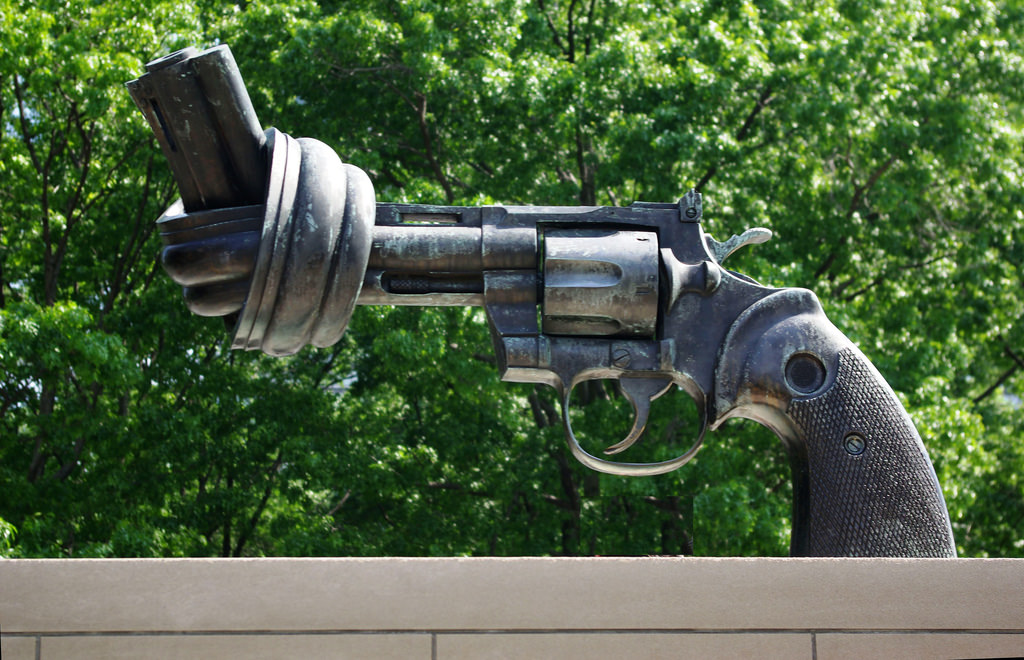
Image courtesy of Alan English CPA under CC BY-NC 2.0.
Remember all the accusations leveled against scholar John Lott after he published his groundbreaking book, More Guns, Less Crime in 1998? When his critics had difficulty challenging his data, they attacked him as a pawn of the gun lobby. Many of the accusations, such as the assertion that gun manufacturers funded his research, were refuted.
Now another academic who has tackled the gun control issue is under fire, with a book that is not holding up nearly as well under scrutiny. Michael Bellesiles of Emory University was the author of the book Arming America, which contended that private gun ownership was far less common in early America than often supposed, thus casting doubt on the interpretation of the Second Amendment championed by the National Rifle Association and others as a protection of individual private gun ownership. He was widely and predictably praised, winning acclaim as a skillful debunker of right-wing mythology from groups like the Brady Center for the Prevention of Handgun Violence and receiving the prestigious Bancroft Award.
The only trouble is, much of his research appears to have been made up. Serious errors in his work have been discovered by sources as diverse as Melissa Seckora of National Review and reporters for The Boston Globe and The New York Times. Liberal columnist Russell Baker has called him “the Milli Vanilli of the academic community,” a reference to a Grammy award-winning pop music act that was later discovered to be nothing more than professional lip-synchers who paid others to record their albums.
Clayton Cramer, who has written two books on the history of American gun laws, told The Washington Times that he has discovered literally “hundreds and hundreds” of errors, some of which he has exposed on his website. Bellesiles argues in his book that a 1792 law requires Congress to supply guns to militia members, while Cramer exhaustively shows that the law required militia members to bring their own guns. This difference is at the heart of the debate over whether the Second Amendment was actually intended to protect private gun ownership, rather than simply the ability of people serving in a government-supported militia unit to carry arms.
Bellesiles also uses a vast amount of probate records to support his contention that gun ownership was rare in the early years of the republic. Yet it is not clear that all of the records he cites existed during a time period when he could have examined them. Bellesiles cites probate records in San Francisco between 1849 and 1859 even though authorities report that these records were destroyed when their repository burned down during a fire caused by the 1906 earthquake.
Northwestern University Law Professor James Lingren has also done some fact checking on Bellesiles’ work. He found that Bellesiles “counted guns in about 100 [colonial Rhode Island] wills where people died without wills.” Joyce Malcom, a Bentley College history professor whose 1994 book To Keep And Bear Arms explored the Second Amendment’s roots in English law said that while it is not uncommon for historians to differ over the interpretation of data, “The book is just riddled with errors. It was so astounding that as a historian, I felt my jaw drop.” Malcom told The Washington Times that the mistakes don’t appear to be accidental. “All his mistakes tend to support his thesis, every single one of them. It is hard to believe it’s in good faith.”
When confronted with charges of deliberate misrepresentation of facts, Bellesiles turns the tables on his critics and alleges that they are the ones motivated by ideology and their stance on gun control. He has claimed that many of his notes were destroyed in an April 2000 flood of his office at Emory. He has also been quick to change stories. National Review’s Seckora claims he has had alternate explanations of the San Francisco probate records while Cramer told The Washington Times that Bellesiles has “changed his story three times” about misquoting the Militia Act of 1792.
James Melton, chairman of the Emory history department, is not simply accepting that Bellesiles is a victim of a vast right-wing conspiracy, which in any event would inexplicably include The New York Times and The Boston Globe. He has asked Bellesiles to reply to his critics in detail to defend the integrity of his work. At this writing, this response has not yet been made public and may still be forthcoming.
Gun control proponents frequently charge researchers who challenge their shibboleths with bad faith, contending that anyone who does not accept their wisdom must be in the pocket of the NRA or some gun manufacturer. It is probably too much to expect than anyone will apologize to John Lott if it emerges that the real propaganda posing as research is on the gun-controllers’ side of the debate.